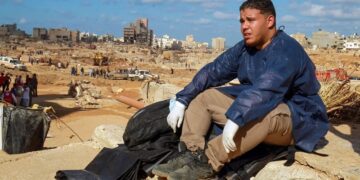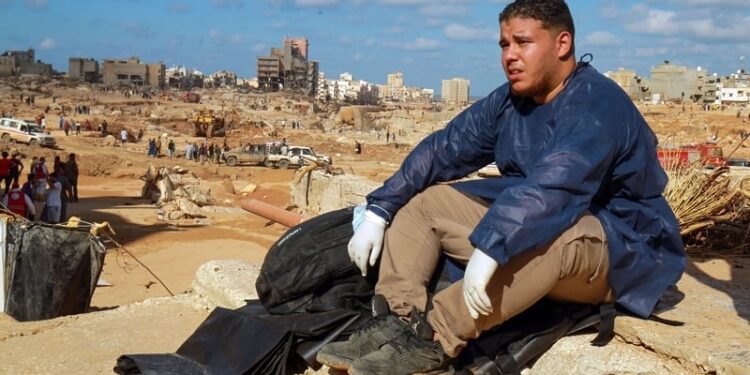By John Ikani
Emergency teams are tirelessly searching for the numerous individuals still marked as missing after a tsunami-like flash flood wreaked havoc on the Libyan port city of Derna, claiming the lives of no less than 4,000 people.
A colossal surge of water breached two dams upstream late last Sunday, leaving Derna in a nightmarish state, with entire city blocks and an unknown number of residents swept away.
Central neighbourhoods on both sides of the river, which typically dries up during this season, met a similar fate. The powerful rush of water uprooted trees and buildings while hurling vehicles onto the port’s breakwaters.
“In mere seconds, the water level surged unexpectedly,” recounted an injured survivor who found himself swept away with his mother during the late-night ordeal. Fortunately, they managed to scramble into an empty building downstream.
“The water kept rising until we reached the fourth floor, and it was up to the second floor,” shared the unidentified man from his hospital bed, as detailed in a testimony published by the Benghazi Medical Centre.
“We could hear cries for help. From the window, I witnessed cars and bodies being carried away by the water. It felt like an hour or an hour and a half, but for us, it seemed like an eternity.”
Derna’s streets are now lined with hundreds of body bags covered in mud, awaiting mass burials. Traumatized and grieving residents scour the wreckage for their missing loved ones, while bulldozers work diligently to clear the streets of debris and mounds of sand.
In a shattered home, a rescue team pumped out water to reveal a woman’s lifeless arms still holding her deceased child, as reported by an AFP correspondent.
“This catastrophe was both fierce and merciless,” remarked Yann Fridez, the head of the Libya delegation of the International Committee of the Red Cross, whose team was on-site in Derna when the floodwaters struck.
A colossal wave, measuring seven meters in height, obliterated structures and carried away vital infrastructure into the sea. Family members are now missing, lifeless bodies are washing ashore, and homes lie in ruins.
Abdelaziz Bousmya, residing in the Chiha neighbourhood spared by the deluge, estimates that approximately a tenth of the city’s 100,000 residents lost their lives.
“I’ve lost friends, my loved ones – they are either buried beneath the mud or swept out to sea by the floodwaters,” lamented the 29-year-old.
The floods resulted from Storm Daniel, a hurricane-strength tempest exacerbated by Libya’s inadequate infrastructure.
Libya has been embroiled in turmoil since the NATO-backed uprising that toppled and killed the long-standing dictator Muammar Gaddafi in 2011, dividing the nation into two rival authorities – the UN-backed, internationally recognized government in Tripoli, and an administration based in the disaster-stricken east.
Petteri Taalas, Chief of the UN World Meteorological Organization, emphasized that many lives could have been spared had early warning and emergency management systems functioned properly in this war-torn country.
With improved coordination, he stated, “warnings could have been issued, and emergency response teams could have conducted evacuations, thereby preventing most of the human casualties.”
Access to Derna remains severely constrained due to the destruction of roads and bridges, along with the disruption of power and communication lines over vast areas, rendering at least 30,000 individuals homeless.
Climate experts have attributed this disaster to the consequences of a warming planet compounded by Libya’s deteriorating infrastructure. Storm Daniel gained strength during an exceptionally hot summer and previously wreaked havoc in Turkey, Bulgaria, and Greece, causing widespread flooding and claiming the lives of at least 27 people.
“Storm Daniel serves as a stark reminder of the devastating impact that a changing climate can have on our world,” emphasized UN rights commissioner Volker Turk.




































